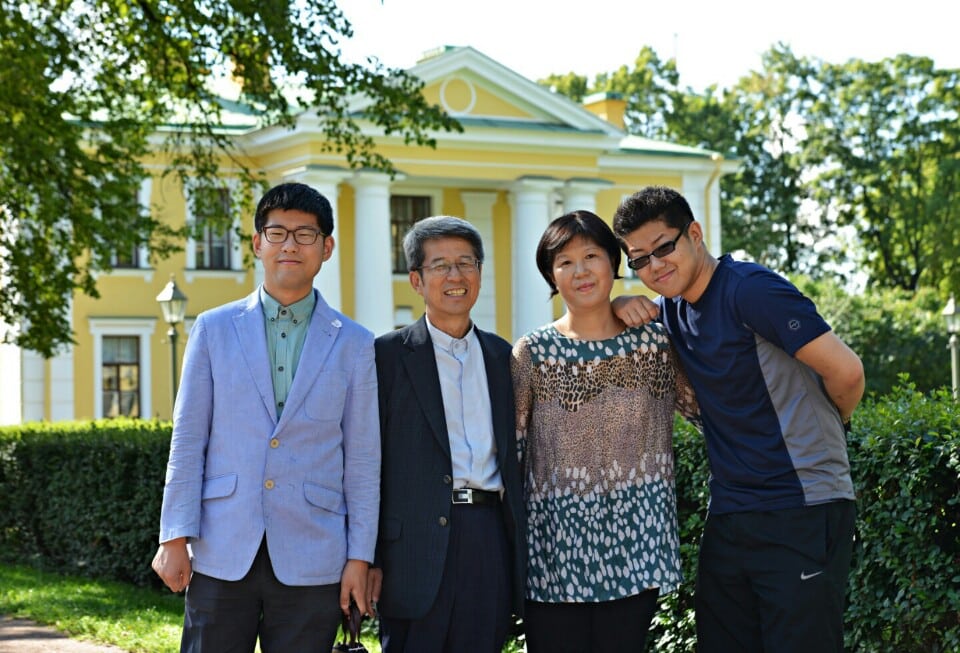
Fulfilling the great commission as a family: Meet the family of Dr. Lee, missionaries in Russia
Photo courtesy of Jong Eun Lee
Trinity Adams, News and Features Editor
In Matthew 28: 16-20, Jesus gives his disciples the Great Commission, which is to go out and make disciples of all nations of the earth. Many Christians receive this call as an opportunity to move to a foreign area to reach lost people. For political science professor Jong Eun Lee and his family, this was a call to move to St. Petersburg, Russia, in 1994.
From an early age, Lee and his family were very well-traveled. Lee was born in South Korea but moved to Singapore at age four. At age five, they moved to Chicago, and at age seven, they moved to St. Petersburg, where his parents finally began their missionary work.
Growing up in St. Petersburg, Lee went to St. Petersburg International Christian Academy. At school all of his lessons were taught in English and Lee had classmates of many different cultural backgrounds.
“I grew up speaking Korean at home with my parents. I spoke Russian at my local Russian church, but [at] my international Christian academy, the curriculum was in Western language, so we would learn in English. So being exposed to three different languages was a key attribute of my upbringing.”
Lee’s family ministry has been operating for 30 years, and his parents have three main ministries operating at one time. They created a local Russian church, an ethnically Korean Church and a Russian seminary. In Russia, the main religious belief is Russian Orthodox. He explained that Russian Orthodox churches are very similar to the Greek Orthodox churches in America.
“Culturally for over 1000 years, Russia has been a country with a large percentage of members of the Russian Orthodox Church. Many people will identify culturally as a member of [the] Orthodox church, but many few members are devout,” Lee said.
Lee explained that there is a large ethnically Korean population. Over 100 years ago, when Korea was a colony of Japan, many Korean citizens immigrated to Russia to start a new life. It is now the grandchildren and great-grandchildren of these Korean immigrants who live in Russia.
“They are Russians culturally, but they are still ethnically Korean so we felt like we needed to create a church just for them,” Lee said.
Another goal that Lee’s parents had was to raise local leaders of their local Russian church so that they could teach and form their own churches. His father gives lectures at the seminary, with the goal of raising the next generation of local Russian pastors.
Looking back on his life in Russia during the 90s, Lee acknowledges that is was difficult compared to life in South Korea and the United States. Many services that are readily available in the U.S. and South Korea were harder to access. Many of the public offices in Russia did not handle customer relations well either.
“As years went by, these got better. But on the flip side, I think as the economy got better, inflation went up. So living standards went up, then housing [and] rent went up. Nowadays, my parents would say the biggest stress is rising rent because they live in the city,” Lee said.
One of the spiritual challenges that the Lees faced was that many were confused about the need for evangelism and ministry. Lee explained that is similar to cultural Christianity in the United States.
“[A] majority of people will still identify themselves as Christian They may not be devout, but they still culturally identify as part of a Christian denomination. [This] means many are more indifferent [or] confused on the need for evangelism and ministry. They sometimes think ‘Why is there a missionary when we’ve been a Christian country for 1000 years?’ That is the attitude that many would have,” Lee said.
Many Christian Russians just attend religious ceremonies, such as Easter, Christmas, baptism, marriages and funerals. Lee explained that many people questioned the need for religious and spiritual gatherings outside of significant dates or holidays.
Many lack the understanding of the need to have a personal relationship with God. Lee explained that daily spiritual life is a hard concept for many to understand. Many people there believe that spirituality is more for special occasions.
Lee said that since he left Korea and moved to the mission field at such a young age, he had an easier time adjusting than his parents. While living in St. Petersburg, Lee was exposed to many different cultures and languages that all had an impact on him from an early age.
When the Lees first left South Korea for the mission field, they never knew it would end up being this long of a commitment.
“In retrospect, when we first got to Russia, we didn’t expect for it to be a 30-year commitment. We thought it would be several years and we would eventually leave, but it became a lifetime commitment,” Lee explained.
He shared that his parents are officially retiring in December of 2025. As of right now, his parents are unsure of what might be next for them, but they are sure to go wherever the Lord may lead them.
